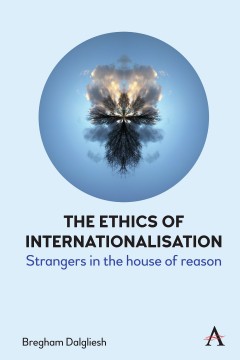The Ethics of Internationalisation
Strangers in the House of Reason
By Bregham Dalgliesh
Other Formats Available:
- About This Book
- Reviews
- Author Information
- Series
- Table of Contents
- Links
- Podcasts
About This Book
The post-1990s commercial turn in the internationalisation of higher education has given rise to the global research university (GRU). Promoting educational exchanges and research partnerships as the engine of the knowledge economy, GRUs that play in a deterritorialised academic super league are hindered by their national origins, in which they remain ethically embedded, and their national orientation to which they are politically wedded. Like any organisation within an institutional environment undergoing change, GRUs that internationalise without also denationalising their organisational culture are saddled with contradictions. The Ethics of Internationalisation offers a critique of three of them: the ethical dilemmas of trans-national scholars, who face estrangement when their difference encounters the ethno-national prejudice of local faculty; the politics of the idea of the university, which under the logic of new public management valorises commercially viable, quantitative research and side-lines critically focused, qualitative studies; and given the event of the Anthropocene, the imperative to reclaim internationalisation from its commercial hijackers in favour of an ethical iteration, which takes up the challenge of thinking the idea of the university vis-à-vis the existential condition of the potential extinction of homo sapiens together with other forms of life on earth.
• The book begins by introducing its niche approach of a philosophy of internationalisation. Using the method of problematisation, the introduction highlights the challenges facing the university today and lays the groundwork for the rest of the discussion by explaining the personal and academic rationale behind the book as well as delving into an interpretation of the notion of the university. Chapter 1 takes up these themes and focuses on the crisis of internationalisation in the global north, where it has been subjected to a commercial hegemony that is blind to the switch in the conditions of possibility for thinking from globalisation to the Anthropocene. Chapter 2 takes its cue from the crisis and lays out an ethics of internationalisation by tracing the genealogical origins of the international to show how an ethical imperative has always informed it. The second chapter also considers geopolitanism as a way to think trans-species subjectivity, which is the mode of becoming-animal that underpins the ethics of internationalisation. Chapter 3 turns to the concrete case of internationalisation in Japan. Through an autoethnography, it discloses the ethical dilemmas faced by trans-scholars in an ethno-national culture and derivative organisational academic life that is designed for the exclusive use of insiders. Chapter 4 continues the pragmatic concern. It analyses how informational capitalism infiltrates the university through the discourse of new public management, which poses a threat to thinking tout court, particularly to critique within the university. As a remedy, the university as a heterotopia, or a space otherwise, is proposed. Finally, the conclusion uses the concept of the stranger as a regulatory metaphor for universities internationalising under the commercial logic and keen to switch to an ethical mode. Strangers, such as the trans-scholar, are unsettling figures who voice the ethical and political dilemmas that arise at the front-line of the process of internationalisation, hereby imploring an unconditional hospitality from the university in the name of its denationalisation, which in turn serves thinking our existential predicament in respect of the Anthropocene.
Reviews
Author Information
Series
Table of Contents
Introduction: The Ethics of Internationalisation; 1. The Governmentality of Teaching and Learning: Acquiescence or Resistance?; 2. Ethical Dissonance in the House of Reason: The Politics of Internationalisation; 3. Reimagining Internationalisation: The Ethics of the Organisational Renovation of the National University; 4. Derrida/Foucault: The Idea of the University as a Heterotopia; Conclusion: Strangers in the House
Links
Stay Updated
Information
Latest Tweets



